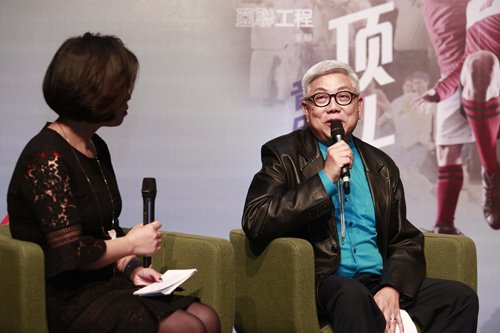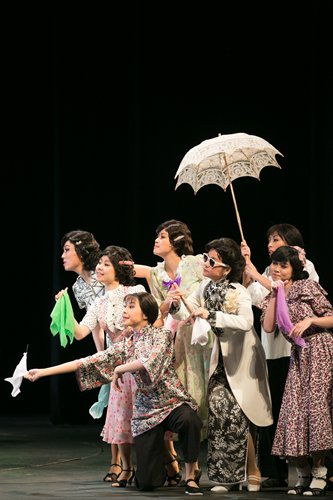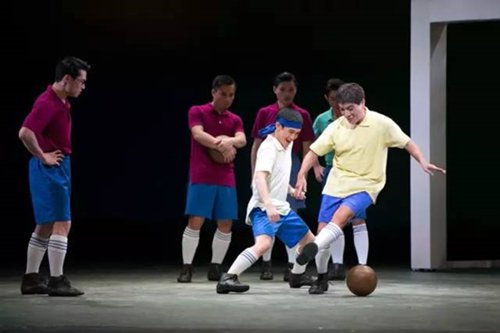
Anthony Chan Photo: Courtesy of Beijing Tianqiao Performing Arts Center

A scene from Field of Dreams Photo: Courtesy of Beijing Tianqiao Performing Arts Center

A scene from Field of Dreams Photo: Courtesy of Beijing Tianqiao Performing Arts Center
It remained a little-known piece of history even among Hong Kong locals until director Anthony Chan turned it into a stage play in 2008.
More than 80 years ago, Lee Wai-yong, Hong Kong's King of Soccer, and seven other soccer players from a small local fishing village made history by becoming the first Chinese soccer team to compete in the Olympic Games.
First premiering in 2008, Chan's musical Field of Dreams will be held at the Beijing Tianqiao Performing Arts Center for the first time from Friday to Sunday as part of the center's activities celebrating the 20th anniversary of Hong Kong's handover to China.
"Even though this musical is about a historical event, it is never outdated to talk about patriotism. During a time when resources were hard to come by, the team's faith and determination to serve the country allowed them to fulfill their dreams," Chan, who is also the artistic director of the Hong Kong Repertory Theatre, told the Global Times on Wednesday at a press conference in Beijing.
Inspiration strikes
"This all started from an idea that hit me after China won so many gold medals during the Beijing Olympic Games in 2008," he explained. "This inspired me to make a musical about the Olympic Games."
Not long after, Chan happened to run into Vincent Heywood, a writer who has spent years researching Hong Kong's soccer history. From Heywood, Chan learned about China's soccer team appearance at the 1936 Summer Olympic Games in Berlin and the stories behind the team.
"That was exactly what I had been looking for," he noted.
"At the same time, I felt a touch of sadness that such glorious and touching history was barely known among Hongkongers. It is important that more Hongkongers know about this and how these soccer players stood out to compete for the motherland during a critical time."
Lacking any travel budget, the team had to fund themselves by taking part in a friendship tournament in Southeast Asia.
"They earned the right to our respect by winning 24 games and playing to a draw three times during the 27-game tournament," Chan said. "It was a remarkable accomplishment for the time and even today, 80 years later their fighting spirit, which is an embodiment of the Hong Kong spirit, lives on."
Learning the game
For the music in his show, Chan made calls to composer Leon Ko and lyricist Chris Shum, the golden duo behind the popular Hong Kong film Perhaps Love, for help. Ko was surprised to hear that Chan was looking to stage a soccer-themed musical and thought it was a near impossible challenge.
"It was a period show, a genre that not that many people would choose to get involved in. Additionally, I hadn't even watched a soccer match before," Ko said at Wednesday's press conference. "But I accepted his offer in the end because I like a challenge. I had to force myself to watch matches time and time again and eventually discovered a secret - soccer has its own unique rhythm."
Ko was not the only one who knew little about soccer. "No one in the cast knew how to play. So we had actual soccer players from the South China Athletic Association teach us," Chan said. "They came to see our premiere show and praised us by saying that we looked like real players."
The musical follows how Zheng Kaiman and Lin Jiazhen, initially rivals on the field, became good friends and built a soccer team to represent the then Republic of China (1912-49) at the Olympic Games.
"In Cantonese, the musical's name Dingtouchui means to fight against all odds and difficulties, so it's a perfect match for their will to fight and confidence that they would succeed," Chan explained.
Time capsule
Since the 2008 premiere, Chan, Ko and Shum have made several tweaks to the musical to make it even more impressive.
For the upcoming Beijing performances, they decided to bring in a live 21-member band to perform the music for the show. The 165-minute musical will also be sung in Cantonese with subtitles in Putonghua (standard Chinese).
According to the trio, they hope the performance of the musical in Cantonese will make the show more immersive for audiences.
"The idea of traveling back to 1930s through music and singing makes me think of the many Cantonese sayings and phases that were only spoken by the elderly when I was young. I added all these into the lyrics to make it sound like that time period," Shum said at the press conference.
"And we make improvements after each performance because we are constantly getting to understand the characters in the musical better."

